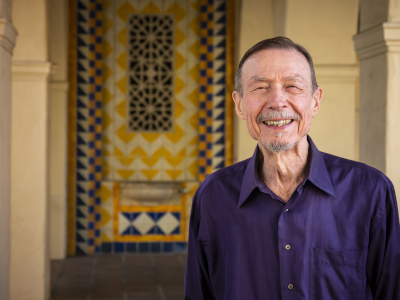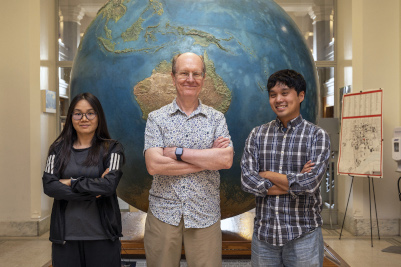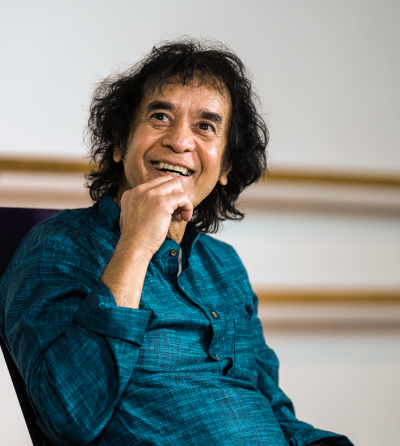UC San Diego, Point Loma Nazarene University Announce 2023 Kyoto Prize Symposium
Registration for free events is now open to campus community and general public
Media contact:
Published Date
Article Content
UC San Diego and Point Loma Nazarene University will host the 22nd Kyoto Prize Symposium to celebrate and honor the 37th annual laureates of the Kyoto Prize, Japan’s highest private award for global achievement, during a one-of-a-kind series of laureate presentations in advanced technology, basic sciences, and arts and philosophy. The presentations, which are free and open to the public, will be held March 15-17.
Tickets will be sold for the symposium’s March 15 gala and opening ceremony at Hilton San Diego Bayfront hotel to help fund the event’s scholarship program (for tickets, contact Marisa Lin at 858-733-0323). The gala will culminate in the presentation of the 2023-2024 Kyoto Prize scholarships, valued at up to US$10,000 or MXN100,000 each, to six outstanding high school seniors from San Diego and Baja-area schools.
The Kyoto Prize is an international award of Japanese origin, presented to those who have made significant contributions to “the development of science and civilization” and “the enrichment of the human spirit.” The late Dr. Kazuo Inamori established the nonprofit Inamori Foundation in 1984 based on his life philosophy, and founded the Kyoto Prize as its primary activity. Since the inception of San Diego’s Kyoto Prize Symposium in 2002, local events have brought more than $4.3 million in educational funding and college scholarships to the San Diego region.
San Diego is honored to be the symposium’s host city to these renowned laureates, who have made influential contributions to their respective fields. Every year, attendees benefit from the laureates’ inspiring lectures and presentations—both at the symposium’s live events and via online video streaming. Inamori, who founded Kyocera Corporation in 1959, established San Diego-based Kyocera International, Inc. just 10 years later as his first subsidiary company outside of Japan. Today, the Kyocera Group includes nearly 300 companies and more than 80,000 employees worldwide.
Online registration is now open for the 2023 Kyoto Prize Symposium’s laureate lectures:
Presentation by Carver Mead, 37th Kyoto Prize Laureate in Advanced Technology
Wednesday, March 15, 2023, 1:00 to 2:30 p.m. PDT
Free registration: https://kps-carvermead.eventbrite.com

Carver Mead, Ph.D. is the Gordon and Betty Moore Professor of Engineering and Applied Science, Emeritus, at California Institute of Technology. Mead’s pioneering contributions to the field of electronics include proposing and promoting a new methodology to divide the design process of very large-scale integration (VLSI) systems into logic, circuit and layout designs, and separating these from the manufacturing process. He also contributed greatly to the advancement of computer-aided design technology, paving the way to VLSI design automation and facilitating the revolutionary development of today’s VLSI-based electronics and industry.
“Starting in the 1960s, Professor Carver Mead developed foundational concepts that enabled semiconductor technology to permeate and transform our world,” said Andrew Kahng, Distinguished Professor of Computer Science and Engineering, and of Electrical and Computer Engineering, and endowed chair in High-Performance Computing at UC San Diego. “He pioneered methods used to design today’s leading-edge chips, and to teach generations of chip designers. His work launched the ‘VLSI revolution’—the democratization of how ideas are transformed into silicon—that we have witnessed in the past half-century.”
Presentation by Bryan T. Grenfell, 37th Kyoto Prize Laureate in Basic Sciences
Wednesday, March 15, 2023, 1:00 to 2:30 p.m. PDT
Free registration: https://kps-bryantgrenfell.eventbrite.com

Bryan T. Grenfell, Ph.D. is the Kathryn Briger and Sarah Fenton Professor of Ecology, Evolutionary Biology and Public Affairs at Princeton University. Grenfell proposed phylodynamics as a methodology to predict the infectious disease dynamics of RNA viruses by considering viral evolution, thus contributing to the development of research fields that integrate immune dynamics, epidemiology and evolutionary biology. These achievements have been instrumental in understanding infection mechanisms and proposing effective infectious disease control policies.
“One of the biggest challenges to stopping global pandemics is integrating information from molecular interactions within cells to patterns of global travel,” said Justin Meyer, Associate Professor, Ecology, Behavior and Evolution Department, School of Biological Sciences, UC San Diego. “With the creation of phylodynamics, Bryan Grenfell created the information integration methods necessary to achieve multiscale comprehension, providing the knowledge and tools necessary to fight pandemics.”
Presentation by Zakir Hussain, 37th Kyoto Prize Laureate in Arts and Philosophy
Friday, March 17, 2023, 10:30 a.m. to noon PDT
Free registration: https://kps-zakirhussain.eventbrite.com

Zakir Hussain is a Grammy award-winning tabla musician who has opened new possibilities beyond the framework of traditional Indian music in collaboration with artists of other diverse genres worldwide. Hussain’s performance innovations include a unique method of creating melodies on the tabla, originally regarded as a rhythmic instrument of accompaniment. In the process, he has expanded the tabla’s possibilities and established it as one of the most expressive percussion instruments in the world. With his superb technique, engaging performances and rich creativity, he has made a tremendous impact on world music audiences and performers alike.
“Maestro (Ustad) Zakir Hussain is a preeminent force in Indian classical music—a tradition that dates back several thousand years, is constantly thriving, and remains at the cutting edge of innovation,” said Professor Kartik Seshadri, Indian Classical Music, UC San Diego. “Hussain is a singular, inimitable, creative genius who has expanded and redefined the scope of the tabla within and beyond tradition. We are honored to have him in San Diego, and to give people a unique opportunity to experience Indian music by one of the best in the genre.”
ABOUT THE KYOTO PRIZE: The Kyoto Prize is presented each year by Japan’s nonprofit Inamori Foundation to individuals and groups worldwide who have demonstrated outstanding contributions to the betterment of society, in “Advanced Technology,” “Basic Sciences,” and “Arts and Philosophy.” The prize consists of academic honors, a gold medal and a cash gift of 100 million yen (more than $750,000) per category, making it Japan’s highest private award for global achievement.
ABOUT THE INAMORI FOUNDATION: The Inamori Foundation is a nonprofit established in Kyoto, Japan, in 1984 by the late Dr. Kazuo Inamori, whose career included founding Kyocera Corp. and serving as honorary advisor to both KDDI Corp. and Japan Airlines. Inamori created the Kyoto Prize in reflection of his belief that people have no higher calling than to strive for the greater good of humankind and society, and that the future of humanity can be assured only when there is a balance between scientific progress and spiritual depth.
ABOUT THE KYOTO SYMPOSIUM ORGANIZATION: The Kyoto Symposium Organization is a San Diego-based 501(c)3 nonprofit established to support the Kyoto Prize Symposium and Kyoto Scholarship programs with the Inamori Foundation and co-hosts University of California San Diego and Point Loma Nazarene University. Since 2002, the symposium has generated more than $4.3 million for scholarships, fellowships and other educational opportunities in the San Diego-Baja region.
Share This:
You May Also Like
Stay in the Know
Keep up with all the latest from UC San Diego. Subscribe to the newsletter today.



